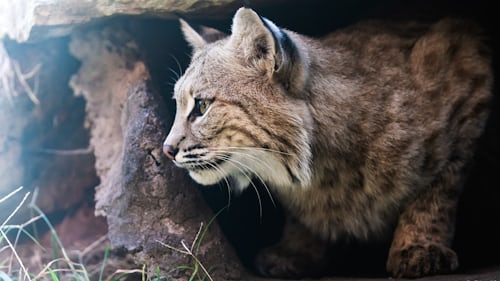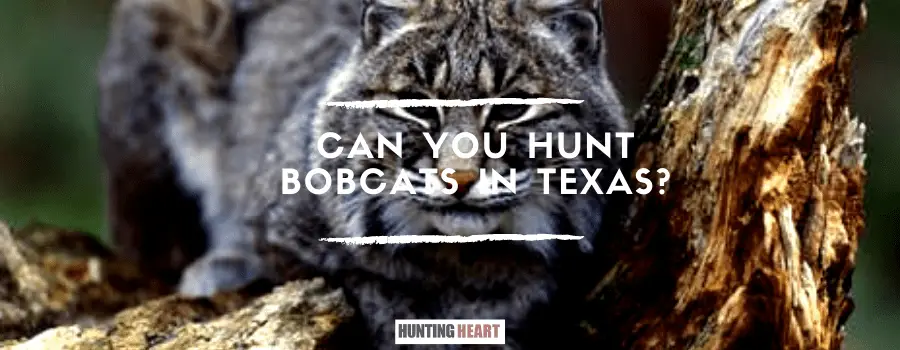As an Amazon Associate I earn from qualifying purchases.
Our Associate portal can be found here
The lone-star state is home to many game and nongame animals. Hunting is permitted on private spreads but with specific public land and season restrictions. One of these is the bobcat, a nocturnal feline with highly developed physical abilities plus a knack for secrecy and adaptability. But can you hunt bobcats in Texas?
Hunting bobcats in Texas, where they’re classified as furbearers, is challenging due to their elusive and nocturnal nature. You can hunt them in this state using a call or round them up with hounds. There is no closed season for shooting these cats, and you’ll require a valid hunting license.
You can hunt bobcats in Texas using any lawful means on private property, but there’ll be restrictions if you’re shooting them on public land. You also can’t take nongame species for commercial purposes such as bartering, exchanging, or selling. Keep reading to see how you can legally shoot these felines in the Texan countryside.
What’s a Bobcat, and How Does It Look Like?
Lynx rufus or the bobcat is also known as the bay lynx or the wildcat. It is a nocturnal feline that can adapt to diverse habitats, including swamps, mountains, deserts, and woodland. The population of bobcats is thought to be in the one million range here in the US. These cats have a red, gray, or brown colored coat, but their underbelly is white while their tail is distinctively black-tipped.
Bobcats get their name from the tail, which appears bobbed. They weigh anywhere between 11 and 30 pounds, ranging from 26 to 41 inches long. That means they’re twice the size of your domestic cat, more muscular, and with a larger bone structure. Its head and legs are better adapted to springing, while its deeper jaw allows the mouth to open wider.
Two subspecies of bobcats exist in Texas, but they’re so similar only experts can tell them apart. The Texas bobcat is found in the northwestern part of the state. Its counterpart, the desert bobcat, lives predominantly in the west. They’re territorial and independent predators, preying on birds, rabbits, mice, small deer, squirrels, and other rodents. It also features improved hearing aided by the pointed, prominently tipped ears with tufts that help to collect sound.
Is Hunting Bobcats in Texas Detrimental to the Environment?
Male and female bobcats are similar in color and appearance, but the toms are larger. You can come across a cat in the 30 to 35-pound range in Texas. They hunt using a stop, sit and wait for prey method, utilizing a lookout or hunting bed as their waiting spots. As it crouches, it’ll slowly rotate to watch the area around it, an action resulting in circular paw-printed beds.
A bobcat depends on hearing and seeing to locate prey, moving in as close as possible unseen to then pounce and capture it. It’s a solitary animal that does most of its hunting at night. With the availability of food, its range varies from five to fifty miles. While ranges overlap, these cats try to avoid each other except during the mating season.
According to the Texas Parks and Wildlife Department, you can hunt any nongame animal within the state. That’s as long as it’s not listed as endangered or threatened and you’re not hunting on public land. You don’t require a hunting license; there are no bag or possession limits and no closed season. You can also hunt bobcats at any time of day or night, but it’s advisable to contact game wardens in advance.
Are There Restrictions in Texas on Hunting Bobcats?
One of the strategies used in the land management toolbox is to hunt predator species like bobcats extensively. Considered a nuisance, nongame animal populations are reduced to help wildlife managers establish other species. But according to the TPW, you can do that until that species’ desired populace reaches an optimal level, then you back off.
For instance, you could be hunting bobcats to raise the quail population. These birds can sustain them with some predation since you’ve provided other prescriptive management like shelter and water. If you put too much pressure on the predators, it may have unintended consequences. That includes increasing their birth rate or a population explosion of rats, mice, snakes, and lizard prey.
These species may also begin to hunt more desirable animals, causing an imbalance in the ecosystem. Therefore, you must have the landowners’ permission to hunt bobcats on private property. It’s also essential to note that you can hunt bobcats for their fur without the need for a trapping or hunting license on private land. But that’s if the pelt or carcass isn’t for sale, in other words, recreational hunting.

If you have a license, the TPW department directs you to take the animal between September 1st and August 31st. You can also obtain trapping permission if you’re interested in commercially harvesting bobcats for their fur. You’ll also abide by the November 1st to March 31st or consult the TPW’s Outdoor Annual.
How Do You Hunt Bobcats in Texas?
You can hunt bobcats at any time, but seeing as they’re nocturnal, it’s better to do it at night. That helps improve your overall success, especially since they’ll easily respond to calls. The best method used by Texan cat hunters is with four-wheel-drive trucks equipped with shooting platforms. Guided hunts will be furnished with such vehicles, where you sit on swivel chairs, shooting at 360-degree angles.
Hunters utilize calls while shining dim reflective red lights that pick up the reflection of incoming bobcat eyes. Once the predator is within gun range, shine a spotlight in its direction and shoot according to the distance and terrain. Small caliber .22-250’s prove better for taking bobcats from 40 yards and out, but a full choke 12-gauge shotgun is effective for running shots.
If you choose a daytime hunt, it’ll involve stalking the lookout beds of bobcats early in the morning and later afternoon. Much like any other hunting, you’ll need full camouflage but stay on the lookout for mountain lions.
Conclusion
Can you hunt bobcats in Texas? Yes, you definitely can. You can take advantage of the little limitations provided by the Texas parks and wildlife department for private property hunting. Although trapping and transporting fur or carcasses is restricted across borderlines, many local outfits run versatile bobcat hunting guided tours.
Amazon and the Amazon logo are trademarks of Amazon.com, Inc, or its affiliates.

36 years old, been hunting and fishing my entire life – love the outdoors, family, and all kinds of hunting and fishing! I have spent thousands of hours hunting hogs and training hunting dogs, but I’m always learning new stuff and really happy to be sharing them with you! hit me up with an email in the contact form if you have any questions.


